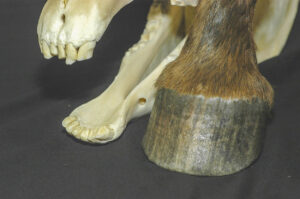Talkin’ Horses Transcript: Dean Richardson
Dean Richardson, DVM, Dipl. ACVS, the head of surgery at the George D. Widener Hospital for Large Animals at the University of Pennsylvania’s New Bolton Center, has been in the public eye since May 20 when he began treating Kentucky Derby winner
- Topics: Article, Fractures, Laminitis (Founder)
Dean Richardson, DVM, Dipl. ACVS, the head of surgery at the George D. Widener Hospital for Large Animals at the University of Pennsylvania’s New Bolton Center, has been in the public eye since May 20 when he began treating Kentucky Derby winner Barbaro for a catastrophic injury sustained during the Preakness Stakes.
An equine orthopedic surgeon who has been at New Bolton for 27 years, Richardson has handled the attention accorded him with an openness and candor that has endeared him to the media and the public.
A resident of Landenberg, Pa., Richardson and his wife, Laura, also a veterinarian, have a son, Alec, who is a senior at Penn. The couple have three horses that are ridden regularly, and Richardson is an avid golfer.
Born in Honolulu, Richardson is the son of a Navy captain who was a physician specializing in internal medicine. Richardson enrolled at Dartmouth University at age 16 with plans for a career in acting. His plans changed after he became hooked on horses while horseback riding as part of a physical education course. A 1974 Dartmouth graduate, Richardson earned his doctorate of veterinary medicine at Ohio State and has been at New Bolton since 1979.
Previous to Barbaro, one of Richardson’s highest-profile equine clients was steeplechaser McDynamo, who earned a second Eclipse Award in 2005 after undergoing surgery performed by Richardson.
Throughout the extensive surgery on Barbaro’s right hind leg and the resulting recovery that was impacted by a case of laminitis in the colt’s left hind leg, Richardson has handled all the pressure and responsibility with professional calmness. Earlier this week, Richardson reported that Barbaro continues to progress to the point he was able to go outside for the first time and graze.
We also urge our readers to donate generously to The Barbaro Fund established by the folks at the New Bolton Center to help support their continuing efforts to pioneer new and innovative treatment for the catastrophic injuries suffered by our equine friends.
Editor’s Note: Due to the unprecedented response to this Talkin’ Horses chat, Dr. Richardson was unable to answer the more than 500 questions submitted. The questions below are a cross-section of those submitted, many of which were the same or similar in nature. Also, the numerous submissions of encouragement and concern for Barbaro and the New Bolton Center team will be forwarded to New Bolton. Thanks for your participation in Talkin’ Horses. –Ron Mitchell, Online Editor, The Blood-Horse
Lynnwood, Washington
How do you currently assess Barbaro’s odds of survival. I know you’ve said his prognosis is poor, and he’s still not out of the woods, but have the odds for his survival improved at all since he contracted the laminitis?
Dr. Richardson
I think his chances of making it are better than I thought 6 weeks ago. The quality of healing of his LH foot at this time is good and I am increasingly optimistic that he may grow a good enough hoof to become comfortable in the long term.
Weirsdale, Florida
Dr. Richardson, actors are a dime a dozen; you are one in a million! Thank you for being given to Barbaro. Will Barbaro receive any water-related therapy? Thank you for being there and being you. Carole
Dr. Richardson
We have discussed and considered various forms of water exercise. Right now it is not feasible because of the cast on the right hind. It is possible that he may spend time in the water sometime in the future.
Monkton, Maryland
I was at the Preakness, and it is one of the most devastating things I have seen in a long time. My daughter wants to become an equine veterinarian. In fact, she would like to attend Penn. She is entering her freshman year of high school. Can you offer any advice on how to best prepare for undergrad and Veterinary School studies?
Dr. Richardson
Sure. Do as well as she can do in high school so that she gets into a good college/university and then do well there. Get appropriate guidance from counselors to take the required courses. Learn about the profession; spend time with veterinarians before she commits to this path. Most important, she should understand that being a veterinarian is NOT just about loving animals, it requires critical thinking and a genuine sense of scientific curiosity to become a good veterinarian
Create a free account with TheHorse.com to view this content.
TheHorse.com is home to thousands of free articles about horse health care. In order to access some of our exclusive free content, you must be signed into TheHorse.com.
Start your free account today!
Already have an account?
and continue reading.
Related Articles
Stay on top of the most recent Horse Health news with

















